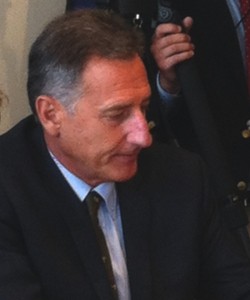Vermont forced to make surprise budget cuts after revenue downgrade

REVENUES GOING DOWN: Gov. Peter Shumlin announced his administration would recommend 4 percent cuts in the budget after economists downgraded the state’s revenues forecast for fiscal 2015.
By Bruce Parker | Vermont Watchdog
MONTPELIER, Vt. — Gov. Peter Shumlin and Secretary of Administration Jeb Spaulding on Thursday said they have begun recommending emergency cuts to Vermont’s 2015 budget after sagging fiscal year 2014 revenue forced a downgrade in the state’s financial outlook.
“As you know, it’s up to the administration and governor now to present options to you. I met with my cabinet yesterday afternoon and instructed them to get back to us with recommendations, giving them as much flexibility as we possibly could, about how we adjust revenues to spending,” Shumlin said during a scheduled Emergency Board meeting at the State Capitol.
According to the governor, planners had been projecting a 4.8 percent growth rate for fiscal year 2015, but have revised that down to a 3 percent rate of growth. Shumlin characterized the move as a downgrade of increased revenues.
“We’re looking at a $28 million dollar downgrade, which for various reasons is really a $31 million dollar problem for your administration. That requires a 2 percent adjustment to the budget you just passed.”
Shumlin said there was a consensus among economists across the country that the recovery was going more slowly than some had projected earlier in the year. However, he sounded a positive note around the fact revenues were up overall for the past few years, pointing out Vermont took in $90 million in fiscal 2013 and $46 million in fiscal 2014.
“This year we are now projecting we will take in an additional 3 percent, which will be the highest revenue year in the history of the state of Vermont,” Shumlin said.
According to fiscal analysis provided by economists Tom Kavet and Jeff Carr at the meeting, the administration was lowering the growth trajectory relative to January, when the Legislature started working on the 2015 budget. The economists said the downgrade was about 1.8 percent in tax revenues, some of which was related to an allocation to the secretary of state’s special fund, but most of which was due to 2014 revenues being propped up by one-time events.
ECONOMY WEAK: Vermont state economists Tom Kavet and Jeff Carr said weak showing in the personal income tax and sales-and-use tax were responsible for the revenues downgrade.
“We had strength in estate and corporate (taxes) from events that were one-time. We would have preferred to have that strength in something like personal income and sales-and-use, which are our two biggest tax sources, but those were behind the ball. So the weakness there meant we’re starting at a lower takeoff point,” Carr said.
To bring spending back in line with revenues, the governor has called for 4 percent cuts in spending.
“What we really asked our agency and the secretary to do is come back with, as a first cut, a 4 percent goal,” Shumlin said. “That doesn’t mean every agency will have to do 4 percent. Some may be able to do more, and some may be able to do less.”
The governor said some rules for bringing the budget back in line with revenues were non-negotiable.
“I made clear that there were certain things that would be off the table. We will not raise taxes on hard-working Vermonters, and we will not in any way shift this to hard-working property taxpayers, who are already having a hard enough time paying their property taxes. So the education property tax shift will not happen,” Shumlin said.
He said his administration wouldn’t interrupt the prior work of the Joint Fiscal Committee to meet debt obligations and teacher’s retirement obligations, nor would he dip into the rainy day fund.
Spaulding said finance and management would work over the weekend and through the week ahead on planned cuts and finalize a plan that could be submitted to the Joint Fiscal Committee within a couple of weeks. That committee would need to hold a public hearing and render a decision on the situation within 21 days.
Shumlin called the new plan a “relatively small adjustment” to a state budget that’s over $5 billion, with a $1.4 billion general fund.
“It works out to a roughly 2 percent adjustment, so let’s not forget we’re going to be up 3 percent instead of 4.8, so we’re still growing,” Shumlin said.
“The fiscal year just started, so if we can move quickly we should be able to do this as painlessly as possible — not to suggest there’s isn’t pain,” he said.
Contact Bruce Parker at bparker@watchdog.org







